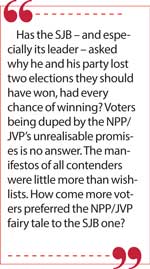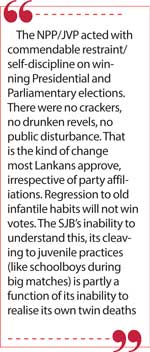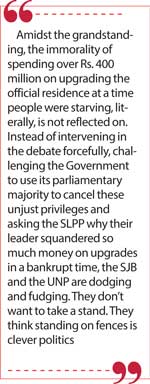Friday Feb 13, 2026
Friday Feb 13, 2026
Wednesday, 5 February 2025 01:02 - - {{hitsCtrl.values.hits}}

“There’s a world outside your window…”
– Band Aid (Do they know it’s Christmas?)
By Tisaranee Gunasekara
 Austrian writer and Nobel Laureate Elfriede Jelinek’s magnum opus, ‘The Children of the Dead’, unfolds in the Austrian mountain resort, Alpenrose. Amongst the inn’s guests are three zombies, seeking ways to return to life. A fellow guest recognises one of the zombies as a man who died recently, but decides to say or do nothing about this knowledge: “One can’t just blurt out, aren’t you dead, Herr Gstranz, it would be too embarrassing.”
Austrian writer and Nobel Laureate Elfriede Jelinek’s magnum opus, ‘The Children of the Dead’, unfolds in the Austrian mountain resort, Alpenrose. Amongst the inn’s guests are three zombies, seeking ways to return to life. A fellow guest recognises one of the zombies as a man who died recently, but decides to say or do nothing about this knowledge: “One can’t just blurt out, aren’t you dead, Herr Gstranz, it would be too embarrassing.”
Jelinek’s zombies know they are dead. Lankan Opposition doesn’t. It suffered two devastating defeats in under two months. But it is yet to face that fact, let alone overcome it.
Ranil Wickremesinghe’s presidency was a black swan event (outcomes which are rare, high profile, and hard to predict – a concept popularised by hedge fund manager turned mathematical statistician Nassim Nicholas Taleb in his book, ‘The Black Swan: The Impact of the Highly Improbable’); during his presidency, the ruling party was not the UNP but the SLPP. His defeat at the Presidential election and his rag-tag coalition’s rout at the Parliamentary poll were foregone conclusions.
 The trouncing of Sajith Premadasa and the SJB was quite another matter. Normally, either the ruling party or the main opposition party (or a candidate backed by it, as in 2015) win in Lankan elections. 2024 was the first time a small third party (dismissively referred to ‘thunpavo’ – tripeds – in allusion to its 3% of national vote in 2019/20) won two national elections (back-to-back) and with wide margins, beating ruling and main opposition parties.
The trouncing of Sajith Premadasa and the SJB was quite another matter. Normally, either the ruling party or the main opposition party (or a candidate backed by it, as in 2015) win in Lankan elections. 2024 was the first time a small third party (dismissively referred to ‘thunpavo’ – tripeds – in allusion to its 3% of national vote in 2019/20) won two national elections (back-to-back) and with wide margins, beating ruling and main opposition parties.
The twin defeats suffered by the SJB were thus unique. The post-mortems of those two defeats too should have been of corresponding extensiveness and incisiveness. These, after all, were not ordinary deaths. They defy easy explanations let alone blasé dismissals. Every organ, however minute, has to be examined to determine the root causes of these unexpected demises.
Instead, there was no post-mortem at all. The only thing that came close to such an examination was Imtiaz Bakir Markar’s December 2024 letter to SJB leader. But that document is likely to suffer the same fate as the 2004 Panditharatne Report to Ranil Wickremesinghe – gather dust in some corner.
Before the answer, there must be the question. Has the SJB – and especially its leader – asked why he and his party lost two elections they should have won, had every chance of winning? Voters being duped by the NPP/JVP’s unrealisable promises is no answer. The manifestos of all contenders were little more than wish-lists. How come more voters preferred the NPP/JVP fairy tale to the SJB one?
 Sans such a post-mortem, the SJB continues with politics as usual in a transformed landscape. A case in point is the ‘blast-from-the-past’ event subsequent to the SJB winning Moratuwa cooperative society election. A supporter lit crackers in the middle of the busy main road, in gross disregard to the safety of vehicles and pedestrians, damaging a passing mini-lorry. The furious owner – a small scale self-employed vendor – protested, shouting, ‘this vehicle is how I earn my living’ (https://www.youtube.com/watch?v=J9SF4x_e6AA).
Sans such a post-mortem, the SJB continues with politics as usual in a transformed landscape. A case in point is the ‘blast-from-the-past’ event subsequent to the SJB winning Moratuwa cooperative society election. A supporter lit crackers in the middle of the busy main road, in gross disregard to the safety of vehicles and pedestrians, damaging a passing mini-lorry. The furious owner – a small scale self-employed vendor – protested, shouting, ‘this vehicle is how I earn my living’ (https://www.youtube.com/watch?v=J9SF4x_e6AA).
The incident was symptomatic. Instead of acknowledging their error, and pacifying the injured party, SJB supporters reacted with belligerence. They were unapologetic, didn’t think the injured party had a right to complain. In that vignette was evident most everything about politicians a majority of Lankans (including those who didn’t and will never vote for the NPP/JVP) find utterly unacceptable, starting with witless arrogance and absolute impunity. (Some of this rot can be seen in embryonic form in the new Government too).
The NPP/JVP acted with commendable restraint/self-discipline on winning Presidential and Parliamentary elections. There were no crackers, no drunken revels, no public disturbance. That is the kind of change most Lankans approve, irrespective of party affiliations. Regression to old infantile habits will not win votes. The SJB’s inability to understand this, its cleaving to juvenile practices (like schoolboys during big matches) is partly a function of its inability to realise its own twin deaths.
As previous cooperative society results show, these micro-polls can be indicative; and misleading. For instance, the SLPP won cooperative elections in Panadura and Gampola with overwhelming majorities in September 2022, less than three months after Gotabaya Rajapaksa was driven out. Perhaps such wins made the Rajapaksas (and President Wickremesinghe) think that they still owned a large chunk of their one-time base. That assumption was a huge mistake.
Reading too much into cooperative society results would be as erroneous as ignoring them. They indicate a potentiality not an inevitability. The Government can be defeated, assuming the Opposition realises where they are and how they got there.
2019 or 1994
 “The world might have been surprised by the size of the Hamas attack,” Marwen Muasher, vice president for studies at Carnegie Endowment for World Peace, said; “but it should not be surprised it took place. The international community bears part of the responsibility for letting the conflict simmer and accepting the longest occupation in modern history.” The 7 October attack was horrendous; but history didn’t begin then. Hamas endures because of Israel’s denial of not just Palestinian nationhood, but Palestinian humanity; Hamas also endures because of the PLO’s venality and inefficiency. Those root causes were the reason Hamas could survive even a genocidal war.
“The world might have been surprised by the size of the Hamas attack,” Marwen Muasher, vice president for studies at Carnegie Endowment for World Peace, said; “but it should not be surprised it took place. The international community bears part of the responsibility for letting the conflict simmer and accepting the longest occupation in modern history.” The 7 October attack was horrendous; but history didn’t begin then. Hamas endures because of Israel’s denial of not just Palestinian nationhood, but Palestinian humanity; Hamas also endures because of the PLO’s venality and inefficiency. Those root causes were the reason Hamas could survive even a genocidal war.
Similarly, the NPP/JVP won mainly because of its opponents’ inability to understand the post-Aragalaya conjuncture and change accordingly. A large chunk of the NPP/JVP vote was a protest vote. Most voters did not want a Gotabaya (or Trump) style economic upending; but they were also wearied of the rotten political culture which sustained and was sustained by a political caste with a mindset more akin to that of royals/nobles of ‘ancien regime’ in France than elected officials in a 21st Century democratic republic.
Addressing a recent workshop, Thilaka Jayasundara, Secretary to the Ministry of Industry and Entrepreneurship Development, explained that a committee has identified more than 113 owned enterprises in need of restructuring. “I hope our minister or deputy minister does not want to maintain these institutions as they are for the sole purpose of appointing their friends into director boards…” Some of these institutions are just name boards, she said; no one even knows where they are (https://www.youtube.com/watch?v=5z7fIcXc5y8). Her words point to a multi-partisan consensus to use lossmaking and even non-functional state institutions to provide cushy jobs for the kith and kin of politicians.
Whether the NPP/JVP will end this practice remains to be seen. But going by the unseemly manner in which the SJB and the UNP/cylinder alliance squabbled over a few national list seats, their willingness to end such parasitic habits is doubtful. The Rajapaksas might be kings of nepotism, but the other Opposition parties haven’t discarded such practices either. Unfortunately, neither the SJB nor the UNP seem to realise how ordinary Lankans, trying to make ends meet, might regard such wasteful and corrupt norms.
 Take the brouhaha about Mahinda Rajapaksa’s official residence. The Presidents Entitlement Act (No. 4 of 1986) was a brainchild of JR Jayewardene. Its purpose was to ensure that the incumbents of the monarchical presidency would continue to burden the public not just after retirement, but also beyond death. Providing all former presidents and their relicts with official residences is probably something only Sri Lanka does. President Jayewardene’s act was an obscenity when it was passed; it is even more so today when almost a quarter of Lankans live in poverty.
Take the brouhaha about Mahinda Rajapaksa’s official residence. The Presidents Entitlement Act (No. 4 of 1986) was a brainchild of JR Jayewardene. Its purpose was to ensure that the incumbents of the monarchical presidency would continue to burden the public not just after retirement, but also beyond death. Providing all former presidents and their relicts with official residences is probably something only Sri Lanka does. President Jayewardene’s act was an obscenity when it was passed; it is even more so today when almost a quarter of Lankans live in poverty.
The issue is not whether Mahinda Rajapaksa deserves an official residence or not. The issue is whether retired presidents (and their widows/widowers) should be maintained in such princely style – especially in a country where poverty has doubled since 2019 (due mainly to the inane governance of that same Rajapaksa, his brother Gotabaya and their family). There should be an informed discussion about what perks and privileges politicians should be given, not in the abstract, but in this specific place and this particular time.
Unfortunately, an informed discussion is the last thing we are having. On both sides, the matter has been overdramatised to the point of bathos. The Government is wagging fingers and unleashing threats. The Rajapaksas are swinging from blustering to lachrymose. The comic abound. Rohitha Abeygunawardane has declared that “There are people in this country who will collect rupee by rupee and build a house for Mr. Mahinda.” (Out of curiosity, what sort of a house can Rs. 342,789 build?). Another acolyte wants to mummify Mahinda Rajapaksa.
Amidst the grandstanding, the immorality of spending over Rs. 400 million on upgrading the official residence at a time people were starving, literally, is not reflected on.
Instead of intervening in the debate forcefully, challenging the Government to use its parliamentary majority to cancel these unjust privileges and asking the SLPP why their leader squandered so much money on upgrades in a bankrupt time, the SJB and the UNP are dodging and fudging. They don’t want to take a stand. They think standing on fences is clever politics.
Litmus tests
In March 2020, Gotabaya Rajapaksa gave an unconditional pardon to convicted murderer staff-sergeant Sunil Ratnayake. Ranil Wickremesinghe, Sajith Premadasa, and Anura Kumara Dissanayake remained mum despite the horrendous nature of Ratnayake’s crime – murdering eight people, including a five-year-old toddler and his two brothers aged 13 and 15. As Justice Buvaneka Aluvihare wrote in the Supreme Court judgement confirming Sunil Ratnayake’s murder conviction, “All the eight deceased persons had sustained the identical fatal injury, a cut on the neck inflicted from behind, as disclosed by the medical evidence” (http://www.supremecourt.lk/images/documents/sc_tab_1_2016.pdf). When the pardoned killer emerged from the prison, he was welcomed by none other than the then defence secretary Kamal Gunaratne.
What sort of monster could cut the throat of a five-year-old child? What is the moral difference between this war-hero and a terrorist?
This shameful and shaming pardon has been challenged in the Supreme Court. If the court revokes it, the Rajapaksas and their lay and ordained followers are bound to howl, ‘betrayal of war heroes and treachery to the Motherland’ from every rooftop. If that happens, where will the SJB and the UNP stand? Will they stand with the Rajapaksas? Or will they stand with those military/police, civil, and judicial authorities who took the sole eyewitness of the Mirisuveli massacre seriously, gave him protection, conducted the investigation with no loss of time, filed a case with enough evidence, and convicted the guilty?
What will the Opposition do if the Government actually brings legislation to remove presidential, parliamentary, and ministerial privileges (and Mahinda Rajapaksa continues with his boy-stood-on-the-burning-deck act)? What will the Opposition do if the Government accepts the recommendations of the SOE restructuring committee and closes down the name-board-only institutions? What will the Opposition do, if the Government keeps its promises to release military-occupied land in the North to their original owners or release political prisoners?
What will the SJB and the UNP do when the Rajapaksas light ethno-religious fires to regain lost political relevance?
The answer would depend on what the UNP and the SJB stand for.
The gap between the hopes of November 2024 and the reality continue to grow as the Government stumbles with rookie mistakes and stand rigid with obduracy. But the benefits aren’t likely to accrue to the Opposition given its uninspiring style and unconvincing rhetoric. The Government is likely to win the coming local government poll, albeit with a much lower total vote, not because it is still popular but because the Opposition is more unpopular.
The Opposition seems to think that 2024 was 2019, that the NPP/JVP Government will collapse soon under the weight of its own mistakes, as the Gotabaya Rajapaksa Government did. 1994 might be a more accurate comparison. Chandrika Bandaranaike Kumaratunga and PA were swept into power on a tidal wave of hope. They failed to live up to those expectations, failed to fulfil most of their promises. Yet that Government endured its first term (and beyond) not because of its own merits but because of the weaknesses of the UNP and its leader Ranil Wickremesinghe. That could well be the fate of Sajith Premadasa and the SJB if they do not exit the cocoon of denial. Soon.